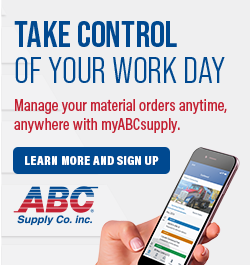The Paper Trail

It’s more important than ever for roofers to have strong contracts and written documentation for projects.
By Trent Cotney
Twenty years ago, a roofer could complete a construction project with a handshake and an invoice. Getting payment from customers has always been an issue, but the need for contracts and written documents was not as important as it is today.
Owners have become litigation and insurance savvy and know how to take advantage of an unprepared contractor. If a problematic project results in litigation, nine times out of 10 the party with the best “paper” will win the day. In other words, the party that has the most detailed and descriptive paper trail supporting its side will more than likely succeed in court.
A contractor, subcontractor, or supplier’s first line of defense to claims on a construction project is always the contract. The contract contains pertinent provisions that a party may use to pursue and defend potential claims. Although it is often difficult to negotiate the terms of a contract, to the extent possible, a contractor, subcontractor, or supplier should be aware of provisions that would help shield it from potential liability from claims. These provisions may include limitations on the types of damages that can be awarded, such as a provision that waives the ability to obtain consequential damages (pain and suffering, lost profits, loss of business reputation, etc.). In addition, contract provisions that require owners to provide written notice to roofers within a certain time period (3 business days) after the discovery of defective workmanship, may create a defense to an owner’s claims if the owner failed to provide sufficient notice.
Anyone involved in the construction industry should also keep accurate written records of all communications involving defective workmanship, delays or other claims on a project. These written communications can include daily reports, e-mail, memoranda, phone messages, and letters. Furthermore, if you notice defective work (that is not your own), make sure to take extensive photographs and/or video of the alleged problems. Visual depictions are especially useful in defending claims where contractors are hired to repair a building that is already suffering from defective conditions, water intrusion or pre-existing mold.
A party should also use common sense when issuing or authoring written communications. Barring any contractual provisions to the contrary, a good rule of thumb is that if it is good for you, meaning that it can assist you with bringing or defending claims, put it in writing. If it’s bad for you, pick up the phone and avoid putting something in writing that can later turn out to be a smoking gun if you are in litigation or arbitration.
Once the roofer has generated documents such as the contract, daily reports and follow-up correspondence, it is important that the roofer retain those documents in an organized file, especially if there is the possibility that the project could result in litigation. By generating and retaining documents which support the roofer’s position, a roofer will be better able to defend itself against litigious owners.
Author’s note: The information contained in this article is for general educational information only. This information does not constitute legal advice, is not intended to constitute legal advice, nor should it be relied upon as legal advice for your specific factual pattern or situation.
Trent Cotney is Florida Bar Certified in Construction Law, General Counsel and a director of the Florida Roofing & Sheet Metal Contractors Association (FRSA), Treasurer of the West Coast Roofing Contractors Association (WCRCA), a member of the National Roofing Contractors Association (NRCA) and several other roofing associations. For more information, contact the author at 813-579-3278 or go to www.roofinglawyer.com.























Comments
Leave a Reply
Have an account? Login to leave a comment!
Sign In